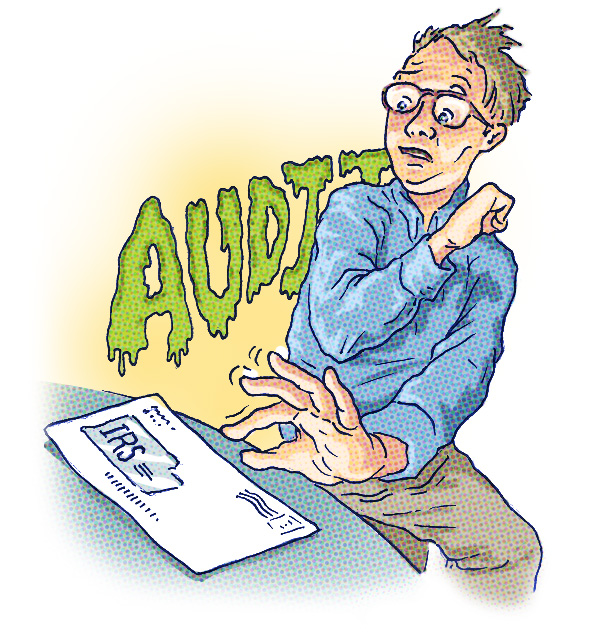How to survive an audit without really trying
July, 21 2020 by Carolyn Richardson, EA, MBA
It’s every taxpayer’s worst nightmare – a letter from the IRS. A lot of taxpayers probably don’t even open it when they first find it in their mail, too afraid of what it might contain. When you finally screw up your courage and open the envelope, you find your worst nightmare is now before you. It’s an audit letter. And while it’s not the best thing to happen to you, it’s actually not the worst thing either, especially in this time of pandemic. Was an audit on your 2020 Bingo card? And if it wasn’t, what do you do now?
First of all, don’t throw the letter in the trash and just hope the problem will go away. Whether the letter came from the IRS or your state tax agency, audits don’t go away from magical thinking any more than Covid-19 does. But fortunately, an audit is something you can be prepared for and come out of okay with just a little effort.
 The first step in preparing for that audit is reading the letter carefully. What year are they auditing? And what items on the return are they looking at? Audits rarely examine everything on the return, but only ask to review specific items which will be listed on the cover letter or an attached document request. Next, how do they want you to provide the documents to them? Many audits take place via correspondence rather than requiring you to go to the IRS in person. While that might seem like a blessing if the thought of facing an auditor terrifies you, it can also mean that the audit can drag on for several months, even if the audit is fairly simple and confined to one or two items on your return. And correspondence audits require a higher level of organization on your part than appearing in person with your documents, as you do not have the opportunity to explain where to find things in those documents that will support your deduction. If you’re already thinking to yourself, “I can’t handle this,” you may want to consider professional assistance.
The first step in preparing for that audit is reading the letter carefully. What year are they auditing? And what items on the return are they looking at? Audits rarely examine everything on the return, but only ask to review specific items which will be listed on the cover letter or an attached document request. Next, how do they want you to provide the documents to them? Many audits take place via correspondence rather than requiring you to go to the IRS in person. While that might seem like a blessing if the thought of facing an auditor terrifies you, it can also mean that the audit can drag on for several months, even if the audit is fairly simple and confined to one or two items on your return. And correspondence audits require a higher level of organization on your part than appearing in person with your documents, as you do not have the opportunity to explain where to find things in those documents that will support your deduction. If you’re already thinking to yourself, “I can’t handle this,” you may want to consider professional assistance.
Once you’ve identified what the IRS is auditing, you now need to find your copy of your return for that year and see what the dollar figure is. Hopefully, you keep all your returns and their supporting documents in one place, but if not, then you will need to find your file box of documents in addition to the return copy. For example, if the IRS is auditing your itemized deductions, you will want to lay hands on copies of your mortgage interest Form 1098, your W-2s and property tax statements to show your state taxes, and your charitable contribution receipts. Sometimes the letter will specify just one itemized deduction such as charitable contributions, in which case you only need to retrieve and organize those documents.
Next, you need to organize those documents. For example, if the charitable contributions are being audited, you need to verify your contributions and whether they were made via cash, check, or credit card. Do you have receipts for all of those contributions? Because the examiner will want to see them. If you made the contribution online, the charity will generally email you a receipt, although some charities will also follow up with a hard copy letter confirming your donation. Get copies of the canceled checks from your bank’s website if you don’t have them included in your bank statement. Check your credit card statements as well for payment confirmation if you donated using a credit card. However, be aware that a credit card statement by itself is not considered to be sufficient proof of any tax deduction.
Add up your receipts – do they add up to the number on the return? If so, you’re probably good to go. If you’re being audited on more than one item, assemble the receipts together by type (such as contributions, taxes, mortgage interest). It’s also a good idea to either use an adding machine with a tape to verify the numbers (if you have one) or attach a spreadsheet listing each receipt’s details and dollar amount. This saves the auditor time as all they have to do is verify what you have on your spreadsheet matches the documents you’ve provided. But what if you come up short? Don’t despair, as all is not lost. If you know what items are missing, you may want to contact the company or organization and get another copy of the backup documents or receipts. For example, mortgage interest statements can be obtained from your lender for prior years, usually online. Property tax records can also be retrieved from your assessor’s office. If you can show the proof of payment but not what you paid for, it may still be allowed but it’s less likely than if you can provide solid backup documents.
Many taxpayers understandably do not want to face an audit on their own and would prefer to have professional assistance and representation, and that's where our Audit Defense service comes in. If you purchased an Audit Defense membership for the tax year that's being audited, all you need to do is notify us of the audit and our professionals will review the notice and discuss with you the issues being audited, any documents you may need to provide, and assist you in resolution of the audit every step of the way!





